Project Profile: Ruckman Farm
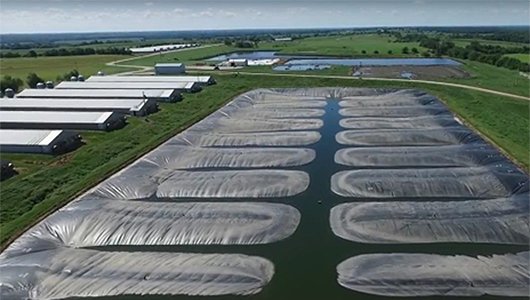
Photo Credit: Butler Bioenergy
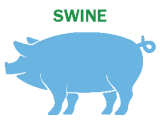

Key Features

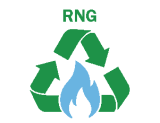
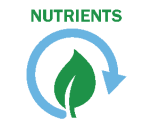
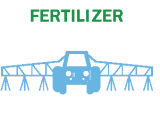

Highlights
- Nation’s first project that converts biogas from hog manure into pipeline-quality renewable natural gas.
- Largest manure-to-energy project of its kind.
- Restores native prairie grasses that are harvested to double biogas production.
Smithfields Foods, Inc., one of the nation’s largest hog producers, partnered with Roeslein Alternative Energy to develop the nation’s largest manure-to-energy project to convert biogas produced from hog manure into pipeline-quality renewable natural gas. Ruckman Farm was the first of nine Smithfield Foods hog production facilities in Missouri where manure lagoons were covered to capture biogas that is cleaned, compressed, and upgraded to RNG.
Injecting Biogas from Hog Manure into a Natural Gas Pipeline
"The technology we’ve developed is ready to be deployed commercially in a project that makes both economic sense and environmental sense. This is not just about converting the manure from almost two million pigs into renewable energy. It’s about taking environmental sustainability to a new level.”
– Rudi Roeslein, Roeslein Alternative Energy
Phase one of the project includes the installation of covers and flare systems on 88 lagoons across nine Missouri farms. Phase two culminates in purification of biogas to RNG for injection into a natural gas pipeline.
The Missouri project was implemented first on Ruckman Farm, and in 2016, Ruckman began injecting RNG via interconnection equipment that has been installed on the farm. As of January 2020, RNG systems had been completed at four additional Smithfield farms across northern Missouri.
This project provides a model that could be replicated at other facilities with manure lagoons. By 2019, Smithfield Foods and RAE had seen enough success from the RNG projects across the Missouri farms to create a joint venture dedicated to the work, Monarch Bioenergy. The companies plan to expand their work to Smithfield hog farms in other states as well.
Restoring Native Prairie Grasses to Increase Biogas Production
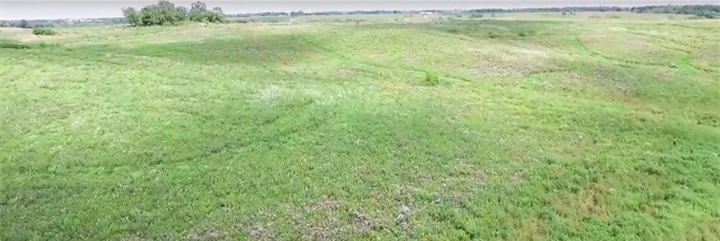
Photo credit: Roeslein Alternative Energy, LLC
"This project will show how farmers can do more than produce food. We can make energy, we can reduce waste, and we can be good stewards for our most important resources – land and water."
– Blake Boxley, Smithfield Hog Production
During the next phase of the project, a prairie grass mixture will be planted on nearby idle lands that are considered unsuitable for crops. Periodic harvesting of the prairie grasses will produce biomass that will be added to the hog manure feedstock, which is expected to double the production of biogas. Restoration of the native prairie lands provides additional environmental benefits — for example, creating wildlife habitat for local species, improving water infiltration, and enhancing the quality of the soil.
About the Digesters
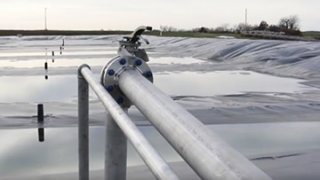
The Smithfield Hog Production project is made up of impermeable covers and flare systems on 88 manure lagoons at nine hog finishing farms.
At Ruckman Farm, one of those nine farms, manure is collected by scraper systems from buildings that house the hogs and is sent to the farm’s nine covered lagoons for anaerobic digestion. The farm’s lagoons are covered with 80-mil high-density polyethylene and low- density polyethylene impermeable synthetic covers. Rain that falls on the lagoons is captured and processed as storm water. Each lagoon is equipped with a flare system for emergency backup.
Annually, the Ruckman Farm project produces a volume of biogas that is equivalent to approximately 1.9 million gallons of diesel. Biogas captured within the anaerobic digester system is piped underground to an integrated 1,350 standard cubic feet per minute pressure swing adsorption facility that refines the biogas to pipeline-quality RNG. The RNG is then injected into the American Natural Resources natural gas transmission system through an interconnection that crosses the farm.
RNG produced from the project is sold to Element Markets, a marketer of biogas and introduced into the California vehicle fuel market.
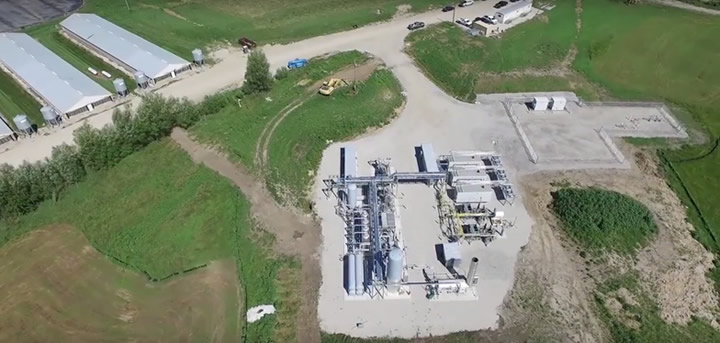
Benefits
Ruckman Farm advances sustainability in the following ways:

- Provides $120 million of investment into the local economy, resulting in numerous employment opportunities for the community.
- Reduces odor from hog manure previously contained in open lagoons.
- Protects human health by reducing pathogens in manure through the anaerobic digestion process.

- Offsets the use of fossil fuel derived natural gas.
- Reduces the use of petrochemical fertilizers by returning the nutrients from the digested swine manure to the soil.
- Improves soil quality and creates wildlife habitat through planting of native grasses.
- Reduces greenhouse gas emissions by the equivalent of more than 25,900 passenger vehicles.

- Diversifies farm revenue by entering into multiple industries (crops, energy).
- Reduces operating costs by producing renewable energy and using it on-site.
- Generates 11.727 D3 RINs (cellulosic biofuel) per one million British Thermal Units, trading at $2.50 per RIN.
- Produces natural fertilizer that is used on the farm, saving costs.
System Design Properties
| Property | Value |
|---|---|
| Feedstock Processed | Swine Manure; Prairie Grasses |
| Throughput | 115,000 tons per year of swine manure |
| Digester Type | Covered Lagoons |
| Population Feeding Digester | Design is 28,000 swine |
| Baseline System | Pond or Pit |
| System Designer and Developer | Roeslein Alternative Energy |
| Biogas Generation | 1.9 million diesel gallon equivalents |
| Receiving Utility | ANR Interstate Pipeline |
| Biogas Uses | Pipeline-quality renewable natural gas |
System Financing
The total cost for the Smithfield Hog Production project is $120 million. The Ruckman Farm portion of the project was financed via private equity from Mr. Rudi Roeslein, CEO of Roeslein & Associates and founder of Roeslein Alternative Energy, LLC, which provided funding for the lagoon covers and equipment in exchange for the rights to sell the biogas.
Recognition
The Ruckman Farm project has received awards and recognition:
- “Friend of ABC Award” from the American Biogas Council in 2016 for contributions to the growth of the biogas industry.
- “2016 Groundbreaker of the Year” award from BBI International for advancing the bioenergy industry by “breaking ground and making meaningful headway on a commercial scale biomass-to-energy project.”
Want to learn more?
Roeslein Alternative Energy Overview
SciTech Now Episode 221 Roeslein Alternative Energy
Pursuant to 5 CFR § 2635.702(c)(2), names are displayed here as the result of recognition for achievement given under an agency program of recognition for accomplishment in support of the agency’s mission. Any reference to a specific company or commercial product or service by trade name, trademark, manufacturer, company, or otherwise does not constitute or imply the endorsement or recommendation of EPA.
